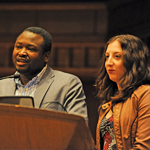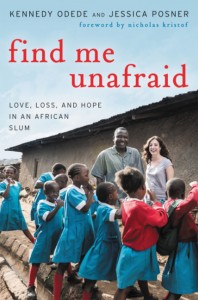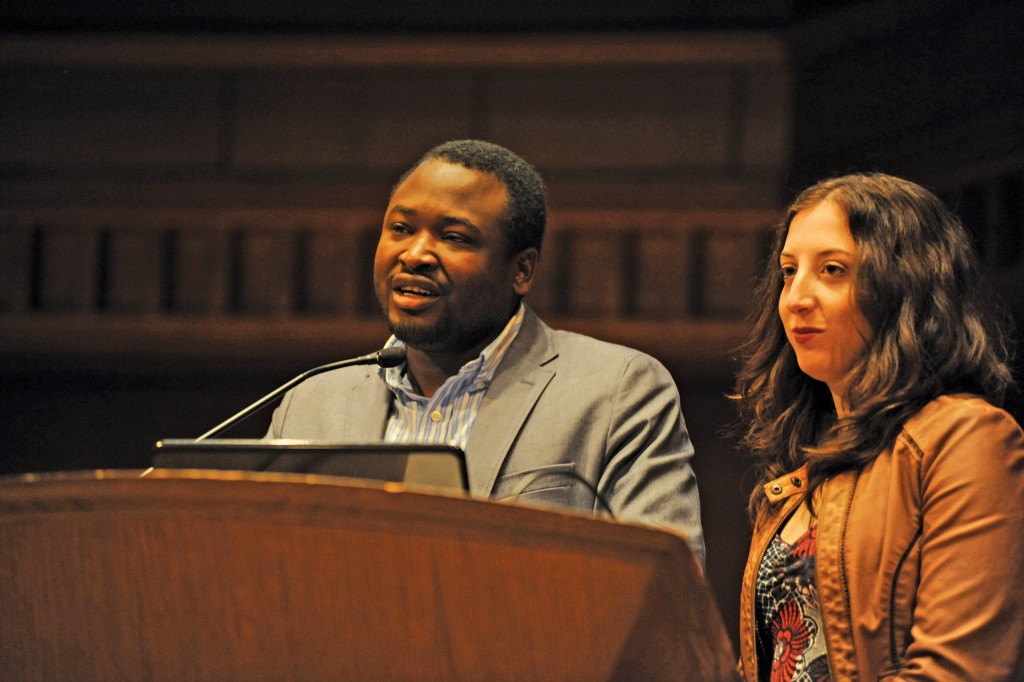FIND ME UNAFRAID: LOVE, LOSS AND HOPE IN AN AFRICAN SLUM BY KENNEDY ODEDE ’12 AND JESSICA POSNER ’09

 Kennedy Odede ’12, who grew up in a Kenyan slum, began a youth empowerment group, Shining Hope for Communities. On a semester abroad, Jessica Posner ’09, joined Odede’s team and the two fell in love. Their book, in which they share their stories in alternating chapters, begins with an introduction by New York Times columnist Nicholas Kristof. It tells the story of their lives, their love, their work and dreams. In this excerpt, the two are at Wesleyan:
Kennedy Odede ’12, who grew up in a Kenyan slum, began a youth empowerment group, Shining Hope for Communities. On a semester abroad, Jessica Posner ’09, joined Odede’s team and the two fell in love. Their book, in which they share their stories in alternating chapters, begins with an introduction by New York Times columnist Nicholas Kristof. It tells the story of their lives, their love, their work and dreams. In this excerpt, the two are at Wesleyan:
Kennedy: One night, after Jessica and I have been fighting, we make up, as we always do, and decide for old times’ sake to make chapati in her kitchen. We’re working in the kitchen when my phone rings. It’s my sister Liz. I am filled with eager anticipation at the sound of her voice. But I can tell, right away, that there is something wrong.
She’s pregnant, at 19. My baby sister. I flash back to when my sister Jackie told me she was pregnant at 17. I feel anger, disappointment, and frustration. I feel like I have failed her.
“How long have you known?” I ask her.
“A few months,” she says.
Liz says that she was raped. She was out late one night, drinking, and accosted on the way home. She says she was so ashamed that she didn’t say anything about it afterward. She thought it was her fault.
I ask her to visit a clinic and have herself tested for HIV. I promise to send her money for the test.
The phone call ends. What I feel is unbearable. Tears start falling from my cheeks.
I wish there was something I could do. I wish there was anything I could do.
I cry all night, and Jessica holds me. African men cry inside their hearts, not outside, but this night I cannot help myself. I feel the absence of my sister, my community keenly.
For days, as we wait for the results of the HIV test, I can’t think of anything else. I don’t understand how these two worlds—Kibera and Wesleyan—can both be happening at the same time. I am angry at these kids here, these kids who have no idea or appreciation for what life has simply handed them. The lives my mother and sisters live haunt me. Although I’m halfway across the world, my entire mind is dwelling on Kibera.
I’m scared for the future of SHOFCO, my organization that has grown from nothing to something. It has been my everything, and it is the one sign of hope for my community.
I go to Jessica. “I know what I want to do. I want to be a bridge, but that is just the beginning. I want to build a school in Kibera, a school for girls like my sisters, so that we can have women leaders, instead of women who are raped and abused. The Kibera School for Girls.”

“The Kibera School for Girls,” Jessica echoes, watching my face intently and seeing on my features that this is no passing fancy. Because I tell her, it begins to seem like it could be real. …
One afternoon, Jessica comes rushing up to me.
“Come here,” she implores, practically dragging my full weight. “There is something I want you to see.”
She pulls me into the Campus Center and points to a sign: 100 PROJECTS FOR PEACE, $10,000 GRANTS. The Kathryn Wasserman Davis Foundation will fund a hundred projects that contribute to world peace. Each project will receive $10,000 to make its proposal a reality.
“What?!” I ask her, confused. She wants to work on world peace now?
“Your school for girls!” she exclaims. “We could apply to build your school for girls.”
“It’s for peace projects, Jessica. That means stuff in war zones.”
“Educated women invest 90 percent of their earnings in family, have children later who are more likely to survive, and are significantly less likely to become HIV positive. In communities where more women are educated, child mortality drops, and economics improve; it impacts everything,” Jessica lectures me. “I think we can make a strong case that a school for girls in one of Africa’s largest slums does contribute to a more peaceful world.”
“I don’t think we’ll get it,” I tell her, shaking my head. I walk away, afraid to fail.
But Jessica, like a dog with a bone, refuses to drop it. A few nights later, she hands me her first draft of the grant application.
“What do you think?” she asks nervously. “Of course it’s not done. I would need you to tell me how we actually do this, like fill in the details about where we would get the land to build it, how we would find teachers—I’ve outlined all those questions in bold…”
My heart is full of emotion. I look her in the eyes. “It’s great.” I see in her eyes that she will make me go through with this. Her belief in me makes me in turn believe in this crazy, impossible dream.
I read a line aloud, a great line:
“This is the very first primary school for girls in the slum, providing a superior, creative education, daily nourishment, and a refuge from the pressures of the slum.”
“My God, Jess. Do you think we could actually do this?”
She takes my hand in hers. “If you tell me how to navigate the logistics, I understand the educational piece and can make a plan for your school.”
I take her hands in mine now. “I believe it. You can make anything happen. And it’s our school.” And it is, I want it to be.
From the book FIND ME UNAFRAID: Love, Loss, and Hope in an African Slum by Kennedy Odede and Jessica Posner. Copyright ©2015 by Kennedy Odede and Jessica Posner. Reprinted by permission of Ecco, an Imprint of HarperCollins Publishers.
